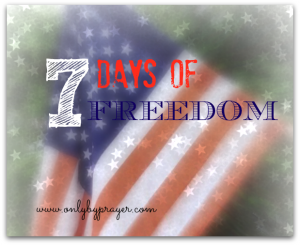Gift of Time and Sabbath Rest, Part 2
I looked at the clock and sighed, frustrated with yet another Sunday evening spent in a haze of laundry. Socks, undershirts, pants, work shirts, and towels stood in piles waiting to be put away while I took out the last load from the dryer. Eleven p.m. and NOT all was well.
last load from the dryer. Eleven p.m. and NOT all was well.
My Sabbath Was Broken
Lying in bed 20 minutes later, I knew something had to change. And I knew where to start …
A few weeks ago, I discussed a niggling in the back of my mind that my Sabbath was broken. The gift of time God had given us with a 7th day to rest just wasn’t happening in my world. I wanted to recapture some of the feeling I had as a child on Sundays: the slower pace, time with family, and a more contemplative approach to the day.
I wanted more margin in my day for reading, walks, visits, or even, dare I say, time to just sit and think or pray. I thought through my day and realized that every Sunday had a common, time-sucking, frustrating activity: laundry. I never seemed to remember to throw in a load throughout the week, so Sunday would roll around and I would be stuck with a mountain of dirty clothes.The simple key to my problem lay in taking that task off of Sunday’s docket.
I decided to spread that chore out over the other days of the week, using Saturday as my catch-up day. Saturday morning, while the last load or two is washing, I also work on cleaning the house. By the time Saturday afternoon rolls around, I have a clean house and clean laundry.
Slow-down Time
 The result being that on Sunday, my husband and I now go to church and came home to tidiness and drawers full of clean clothes — and time on our hands. The first free Sunday, we spent the afternoon on an autumn walk, exploring a new trail and God’s breathtaking creation. I can’t quite describe the peace that having a margin of time gives me.
The result being that on Sunday, my husband and I now go to church and came home to tidiness and drawers full of clean clothes — and time on our hands. The first free Sunday, we spent the afternoon on an autumn walk, exploring a new trail and God’s breathtaking creation. I can’t quite describe the peace that having a margin of time gives me.
I luxuriate in the freedom to spend this day more as God intended, not lost in a haze of mundane chores and stressful striving. I know I need to make tweeks to my schedule still, and as I continue to explore this topic, I will.
How about you? Are you looking for a little margin in your Sunday to help you celebrate the Sabbath? I have a few suggestions:
- Honestly evaluate your Sunday. What chore is causing you the most stress/taking up the most time? What is the next thing?
- Can you move the time-sucking activity to another day? If not, look at the next item on your list. Can that be changed or moved?
- If neither of them can be adjusted, then pray about whether you really need to be involved in this activity. Or, perhaps you’re involved in ministry work and Sunday is the busiest day of the week. Make sure you’re not scheduling afternoon meetings that could be moved to a different day. As some other pastors do, you may need to take your Sabbath on a different day of the week.
What Does the Rest of the Week Look Like?
Most likely you’ll also need to consider your schedule on the other six days of the week so that you can free up some time on Sunday.
Now I realize as an empty-nester, I have more leeway because I no longer have kids’ activities to worry about. However, when our children were home, we made some hard choices. Each child was allowed to participate in one activity besides youth group, and that was it. And that activity could not include travel sports, because my husband and I decided we were not going to spend every weekend on the road. That was not a healthy, sustainable life for us.
If your children are involved in multiple activities that have you running nonstop, it’s time to reevaluate. It is perfectly acceptable to say “no” to too many activities. Prayerfully determine your priorities as the parent and decide how to implement that decision for your family.
Let’s not accept the status quo. It’s time to take back our Sundays. Creating margin in your day just may be the spark you and your family need to breathe, grow, and thrive.
Pray on!




![ID-10057612[1]](https://onlybyprayer.com/wp-content/uploads/2013/03/ID-100576121-198x300.jpg)

